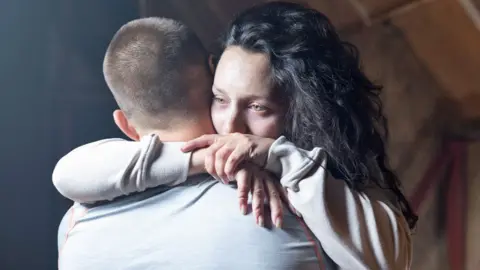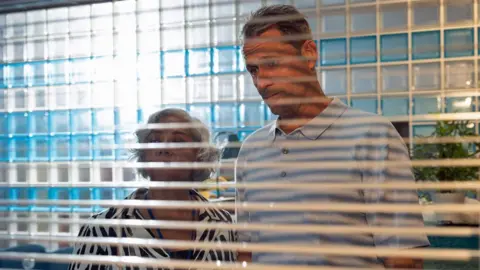This website uses cookies so that we can provide you with the best user experience possible. Cookie information is stored in your browser and performs functions such as recognising you when you return to our website and helping our team to understand which sections of the website you find most interesting and useful.

 Lime Pictures/Channel 4
Lime Pictures/Channel 4In one of British TV’s more unusual soap plot twists, the action in Channel 4’s Hollyoaks is jumping forward by a whole year - to let producers reduce the number of episodes and cast members, in the latest cutback to TV drama.
How do you get rid of 20 people in the same small, tight-knit, already troubled village?
Set a serial killer on the loose? Summon a major disaster?
No soap boss would willingly scale back their show, but if they were forced to undertake a major cast cull, most wouldn't pass up the chance to unleash a wave of death and destruction.
However, when Hannah Cheers took over Hollyoaks earlier this year - as it was announced that the show would have its headcount, budget and episodes slashed - she didn't want her storyline to be too "negative and grim".
Instead, she came up with a more radical idea - to skip forward in time by a whole year.
"It actually gave us so much more scope for the 'what if' questions, and a soap audience love the what, where, how the hell have you got there?" Cheers says.
"And actually, all of a sudden, this was way more valuable than a plane crashing on the village, because that only ends one way - death, in a coffin, sadness.
"Whereas we've got a mechanism that has led to new friendships, new romances, old relationships being rekindled, pregnancies, secrets, mysteries - all from moving a year in time."
 Channel 4/Lime Pictures
Channel 4/Lime PicturesThere's still some death and destruction - this week is Hollyoaks' annual "stunt week".
It's also the first week for 25 years that the show has had three episodes, down from the previous five.
Then on Monday, the action will leap 12 months ahead, and viewers will start to piece together what's happened to the characters who are still standing, and those who aren't.
As well as culling the cast by a third, a similar proportion of jobs - about 130 - have been lost behind the scenes on the show's Liverpool set.
In the past few years, Channel 4 has cut its programming budget because of a downturn in advertising revenue, part of a funding squeeze throughout the TV industry.
Among other long-running dramas, the BBC has axed Doctors and Holby City, and trimmed the number of episodes of Casualty (but has revived Waterloo Road). Meanwhile, Channel 5 axed its funding for Neighbours.
Massive changes
On Hollyoaks, made for Channel 4 by Lime Pictures, the past six months have been "a testing time", executive producer Cheers says.
"It's been really tough, but I am incredibly proud of how everybody across the business has pulled together."
The soap's remaining cast members share those sentiments.
"With there being massive changes and so many redundancies, it was a really sad place to work for a good few months," says Jennifer Metcalfe, who has played Mercedes McQueen for almost 20 years.
"It's getting better, the energy, but we've lost a lot of good friends."
She's speaking after a screening of the time-jump episode for cast, crew and press in Liverpool.
"To stand here today and watch a show that looks sparkling, that looks very current and like it's progressing, not moving backwards - I feel really proud of us," Metcalfe adds.
In the 1990s and 2000s, soaps ramped up their output during a period of rampant episode inflation. Going in the other direction has a silver lining, the actress says.
"It gives us more time to tell stories with more patience, and more time to prepare, more time to attack the storylines.
"When you're churning out five episodes a week and you're in for 10 or 11-hour days, it's really difficult to keep up the energy always on a continuing drama."
'We have to reinvent'
Tyler Conti, whose character Abe is at the centre of a coersive control storyline, adds: "You trim the fat, almost, and it feels like then you can really live in those stories that we're telling within those three episodes."
"It's also reflective of how people watch TV these days," adds Nadine Mulkerrin, who plays his on-screen partner Cleo.
"Who watches TV live any more? We're all streaming it."
Indeed, Hollyoaks hasn't actually been on Channel 4 for a year, apart from a weekly omnibus in the early hours. Episodes are now on sister channel E4, the broadcaster's streaming platform and YouTube.
Channel 4 has trumpeted its E4 and streaming ratings. The show is currently watched by about 600,000 people a day, but that is down by a third in two years, and soap ratings have been steadily falling across the board.
Bosses say the main reason for the Hollyoaks episode cut comes from research saying viewers were only watching three out of the five episodes a week on average.
"Our audience is younger and they're consuming the show differently," says Channel 4 drama commissioning executive Ben Wadey.
"Hollyoaks is nearly 30 years old, and if we're trying to still make that show from 30 years ago, I don't think it's going to work forever.
"We have to move forward, we have to reinvent. We can't rest on our laurels, and we can't just do it the same way we've always done it. We've got to make those changes, which will mean it's fit for the future."
 Channel 4/Lime Pictures
Channel 4/Lime PicturesChanging audience habits don't tell the full story, though. Money plays a big part, the Sun newspaper's soaps editor Carl Greenwood says.
"Channel 4 have slashed their budget. Everything has to be cut, and soaps are a big part of that, so it's only three days a week."
The cuts to Hollyoaks and Doctors will have a big impact on people who want careers in the TV industry, he says.
"There isn't much opportunity for working-class people to go into TV any more.
"Hollyoaks has produced Oscar winners, so the talent's there. But without the scale of the production, the talent can't come through."
Others have also expressed concerns.
Actors' union Equity has said the Doctors and Hollyoaks cuts mean "continuing drama series have been dealt a real blow".
Broadcasting union Bectu said the Hollyoaks announcement was "absolutely devastating news for everyone concerned, for the region and for the wider UK TV industry".
'No managed decline'
Bectu assistant national secretary Jenny Tingle says many of those who have left Hollyoaks haven't found other work in the industry.
"Some of them, like the members in make-up and hair, were probably going to go and work in the wedding industry and stuff like that," she says.
"There was a sense that they weren't going to be able to keep doing that type of [TV] work, which is a real shame, to lose those skills and that experience."
The impact of cuts is felt more in places like Liverpool and Birmingham, where Doctors was made, than it would be in London because the TV industry is smaller in those cities so workers have fewer options, she says.
For those who remain on the show, "we've just got to hope that it can survive going down to three episodes".
Channel 4 insists it is committed to Hollyoaks' future, and that taking it off the main channel and cutting its epiodes isn't part of a strategy of managed decline.
"There's no pulling back from the show," C4's Wadey says. "If anything, we're leaning into it.
"We want this to work. We have to make it work, this switch to three episodes, because we believe it is the future."
So does the Hollyoaks time-jump mark a brave leap into a new era, or the beginning of the end for British soaps?
Not even the Hollyoaks scriptwriters can see the future clearly enough to answer that.



 Africana55 Radio
Africana55 Radio 

